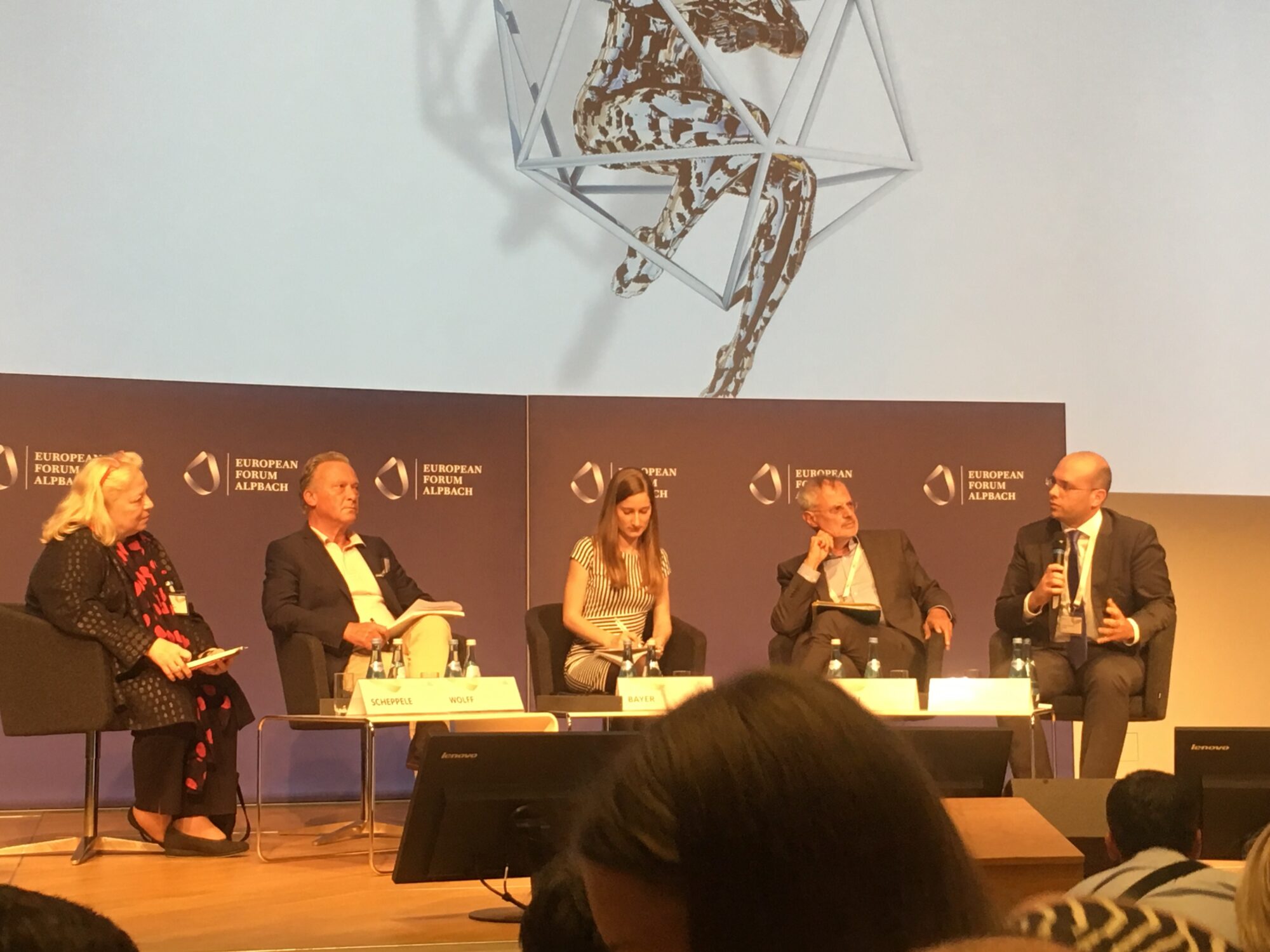The new committee chaired by von der Leyen has an interest in terminating rule of law proceedings against Hungary and Poland and starting a new chapter in the relations of Member States and Brussels based on mutual trust, said Ágoston Sámuel Mráz, head of Nézőpont Intézet during the European Forum debate in Alpbach.
The overwhelming majority of attendees were liberals. Originally the event was going to be opened by the late academician Ágnes Heller, and the rule of law debate was attended by two vanguards of the international smear campaign against the Hungarian government, Princeton lecturer Kim Lane Scheppele and University of Florence professor Gábor Halmai, accompanied by President of the Viennese Bar Association Rupert Wolff. The moderator, a Hungarian-born Politico journalist conducted a poll among the audience of about one hundred that voted yes both before and after the debate on extending the European Union’s powers to enforce the rule of law.
Liberal “Hungary experts”, of course, called for more decisive action against Hungarians and Poles saying it was in the interest of the Union. Both Gábor Halmai and Kim Lane Scheppele called for financial sanctions to enforce the rule of law. The US professor went as far as to say that States that are not members of the EU prosecution service should be deprived of EU funds. The expert, who has been commenting on developments in Hungary with sharp criticism since 2010, repeatedly highlighted Frans Timmermans’ welcome role in the proceedings against the Hungarian and Polish states. The only dispute between the two liberal participants who share a friendship was whether the European Union has sufficient means to monitor Member States that violate the rule of law. Kim Lane Scheppele said these were lacking and called for new procedures, while Gábor Halmai thought that there were sufficient, effective means, but political will to use them was lacking. He said that was also the reason why rule of law proceedings against the two countries had stalled.
Ágoston Sámuel Mráz did in fact welcome this process and said he believed that the new European Commission had an interest in restoring broken trust in its relations with Member States and that Article 7 proceedings would have to be terminated in order to do this. Such rule of the EU treaties is important, of course, but it should be applied only when a Member State becomes a dictatorship and is not suitable for the resolution of political disputes. Not least because the rule of law did not have a uniform European definition, Mráz said, meaning that it is interpreted differently in each cultural environment, English, German, French and Central European. This was later also acknowledged by Gábor Halmai, but he nevertheless urged that the action against Hungary be continued. The head of Nézőpont Intézet also added that European treaties not only protected the rule of law but also subsidiarity, meaning that problems that arise should be addressed as closely as possible to the people. To make a point he brought attention to the concept of a “self-protective legal state”, such as Hungary, whose constitution has prescribed and its constitutional court protected the principle that “Hungary is an independent, democratic state under the rule of law” since the change of regime.
In addition to attendees, audience members could also ask questions, reflecting the liberal dominance of the event. Most of them attacked Mráz claiming the primacy of European law – on which he agreed – or demanded that he should apologise for talking about Poland’s willingness to compromise in relation the rule of law proceedings against it. The most militant questioner, however, was Democratic Coalition politician Ágnes Vadai, who unfoundedly called him to account for a lack of public procurement procedures in relation to Nézőpont Intézet’s commissions by the government, and also claimed that the Hungarian prosecutor’s office was biased. To this the challenged presenter responded by citing the prosecution charge in the Simonka case, which caused visible surprise among non-Hungarian participants as it involves a pro-governmental representative.
No participating expert, of course, could have decided the termination of Article 7 proceedings, but it is an interesting conclusion that Gábor Halmai was not confident the proceedings would be completed, Kim Lane Scheppele called for a different procedure, and Ágoston Sámuel Mráz suggested that they be terminated. The frustration of liberal participants suggests that they are mentally preparing for the termination of political attacks advocated by Timmermans, as in the future he will be given different responsibilities in the Commission.
